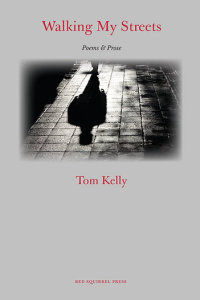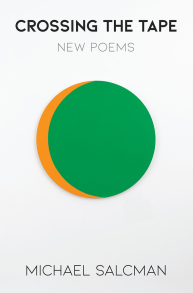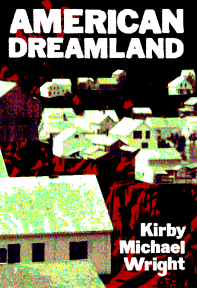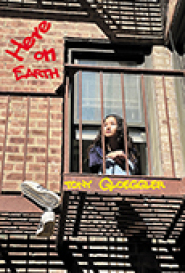
Marianne Brems, Stepping Stones
As the Light Bends
Familiarity lies in the angle
the daisies hold their white heads
above the walk,
the smell of magnolias
like my friend’s old house,
the way evening clouds
redraw the roundness of setting sun.
Each softens the bulk of strangeness
in a lesser known place.
With the coming of another day,
moisture settles in the early thickness
of morning fog,
shadows of madrone
absorbed before they begin.
No dark lenses between us
as a stranger stops to ask,
Have you seen the young ones in that nest?
This emerging mosaic
of familiar and unfamiliar
begins a conversation
with this place where no one yet loves me.
As the light bends with our presence,
somewhere a lock uncatches
in a door called home.
Mary Gilliland, Ember Days
As Though Finny Folk Would Flip
As yet unknowing that fish
talk, ragamuffins living on the castoffs of the rich
believed the sound
was Russian sonar
or the CIA broadcast of operatives who spiked the Bay
Area’s office Koolaid
rather than a feature
of the tête-a-têtes of simple fish whose school
colors matched the weathered
gray of houseboat hulls.
Echolalia—in those day—and echelons
were common.
In rank water
beneath the houseboats of Sausalito in the mid70s
plainfin midshipmen hummed.
Echolocation
was some imagined edge of language
for the experts
when anyone wo’th his salt
could hyphenate. In ‘75 you could nearly find Tallulah Bank-
head still alive
but no animal sound
was believed to signify—not dolphins, not elephants,
not—gadzooks and heck—
emissions of plainfin
midshipmen. It took a Cornell neurobiologist
who dined in gloves
in the lab building’s
cafeteria sometime in the late 90s to determine
the source of the sound.
By her time
the houseboaters had stopped accusing anyone of spying
on their lives
for they had bottomed out.
They were renting basement studios. Ordinances
word processed skillfully
by cronies of the rich
had made the docks accessible only to other cronies.
At that time
and sometimes
even today, not all midshipmen are
commissioned.
Tom Kelly, Walking My Streets
One Day This House Will Be Empty
messages found behind wallpaper
photos buried in pelmets
strangers smiling back.
Walls disappear, make way for a glossy kitchen,
have visitors asking “Who lives here?”
Filigree ceiling dust settled for too long disappears.
Orphaned keys in a jar under the sink.
Walls, floors and ceilings gouged,
leaving gaps where only memories lie.
Children once filled every room: cots to king-sized beds,
long legs sliding out of a too small divan.
One day this house will be empty of us.
Michael Salcman, Crossing the Tape
The Long Moment
I have kept my ear against the sky
forever and ever
where the radiant past of a distant star
with the faintest signal from another galaxy
seems to say here we are
shake hands with your relatives,
lovers and friends,
and the light of that star will catch you up
with the past when the present evaporates.
Of the future nothing is known
but the past is certain, banked in ledgers
and journals, and shining in our lenses
on mountaintops from light years away.
After the Sun grows cold
the planets of a more distant star
will see us on our return
and hear our voices in their telepathy.
Our past is their future, its music and film
and the thin line of our poetry—Take care.
Kirby Michael Wright, American Dreamland
American Dreamland
Home? A 2D dream
Favored by nuclears
Hooked on gossip, games, and drink.
Faces and bodies flat as ‘50s cartoons,
Inspiring a village droop.
Women talk like men.
Men hire gardeners.
Children bark orders.
Hydrants painted canary yellow.
Smart doorbells chime
Three-note warnings of strangers.
Roofs wear red tiles
Like battle gear,
Defying criticism
With conformity shields.
Newlywed gents on the corner
Adopt daughters,
Raise them in dresses.
Trust baby Conrad circles the block
Spying from his hybrid.
Boomer dogs decorate lawns.
Banana tree slumps
Like a bored penis
From almost-frost.
Streets slick under skins
Of oily asphalt.
The star pine home
Swarms roof workers
Born in Mexico.
EVs roll by with
End-of-the-world whines.
Blonde Gen Xer saunters,
Tank-top breasts soft as dough.
The whites of her eyes go silver.
Barry next door plays dull guitar
While the widow under the streetlight
Poisons her hedge of hawthorn.
Old Man Dickey wants a divorce
To make room for the widow.
A blue uniform drifts door-to-door
Selling electricity.
Junk food millennials
Live to die in cookie-cutter rows.
Tiny cardboard replicants
Ride bikes and razors
Dodging Kids At Play signs.
A poisoned rat
Wobbles yard to yard
Struggling with dehydration.
Parents march pancake blacktop
Tattooed by chalk scribbles
And hopscotch rectangles.
Smell holiday?
Hotdogs char and crack
On backyard grills.
Despair fills melancholy cupboards
And garage corners
Where crickets crick
And black widows spin
Haphazard webs
In everlasting darkness.






